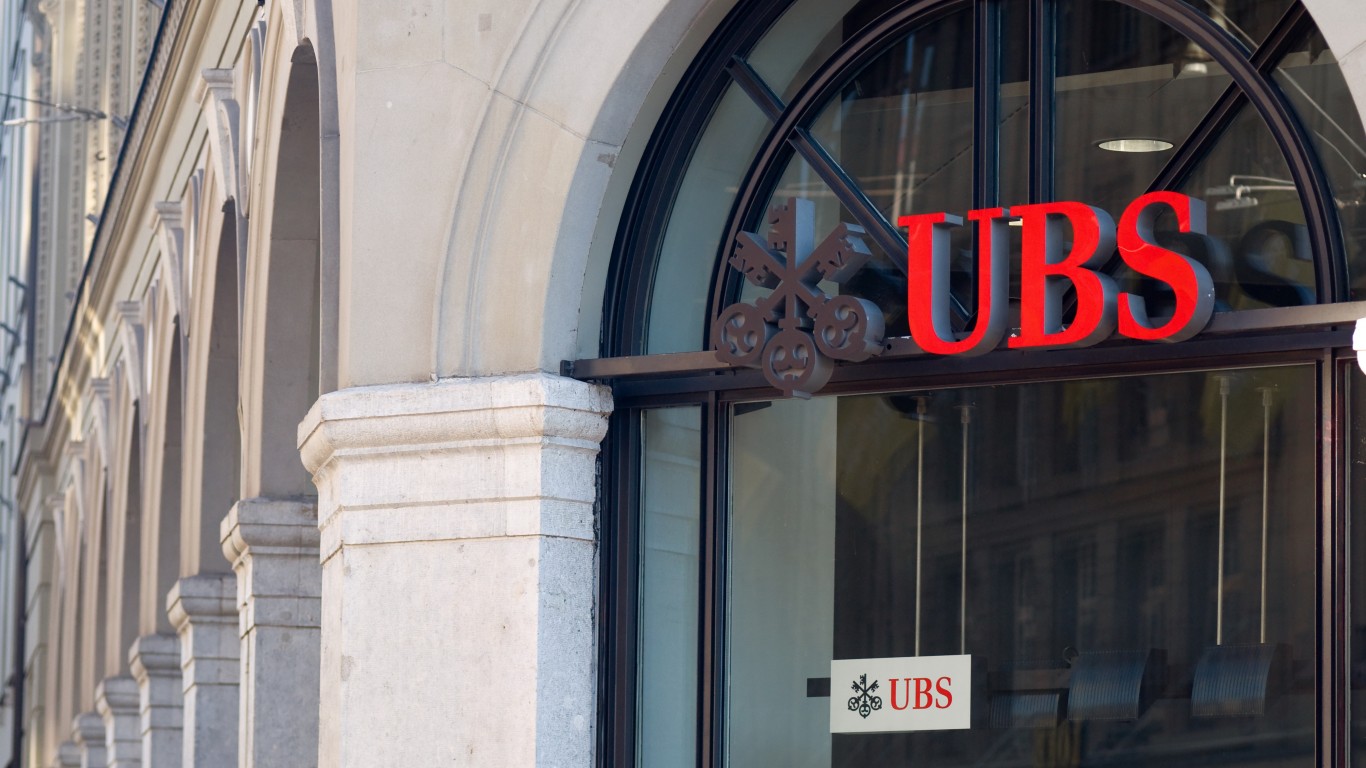Investing
Before the Bell: UBS Stiffs Its CoCos and a Wager on Bitcoin Reaching $1 Million by Summer

Published:

Premarket action on Monday had the three major U.S. indexes trading slightly higher. The Dow Jones industrials were up 0.11%, the S&P 500 up 0.15% and the Nasdaq 0.16% higher.
All 11 market sectors closed lower Friday. Financials (−3.29%) and real estate (−2.27%) fell the most. Technology (−0.11%) and communication services (−0.48%) posted the day’s smallest losses. The Dow closed down 1.19%, the S&P 500 down 1.1% and the Nasdaq down 0.74% on Friday.
Two-year Treasuries plummeted by 33 basis points to end Friday at 3.81%, and 10-year notes dropped 16 basis points to close at 3.39%. In Monday’s premarket, two-year notes were trading at around 3.81% and 10-year notes traded at about 3.39%.
Friday’s trading volume was well above the five-day average. New York Stock Exchange losers outpaced winners by 2,550 to 100, while Nasdaq decliners led advancers by about 3 to 1.
Leading Friday’s winners was FedEx Corp. (NYSE: FDX), up 7.97%, following a solid earnings report late Thursday. Quarterly results were not all that good (both profit and revenue were lower than a year ago), but the package delivery giant has had some success with its cost-cutting endeavors, and CEO Raj Subramaniam said that those efforts have led to an “improved outlook” for this year.
No big surprise that the day’s biggest loser was First Republic Bank (NYSE: FRC). The bank’s stock dropped 32.8% on Friday, and its loss for the week was around 72%. While the $30 billion rescue package put together on Thursday was essentially canceled out by the suspension of First Republic’s dividend, the turmoil with Credit Suisse Group AG (NYSE: CS) sent virtually all bank stocks lower Friday, with the weakest taking the biggest hits. U.S. Bancorp (NYSE: USB) dropped 9.38%, Comerica Inc. (NYSE: CMA) fell 8.44% and Lincoln National Corp. (NYSE: LNC) fell 8.19%.
All eyes will be on the Federal Reserve’s FOMC meeting, which begins Tuesday and ends Wednesday with a press conference and a decision on an increase in the federal funds rate. Investors are betting that the Fed will not raise rates on Wednesday, given the upheaval in the global banking system.
Other data due next week are the National Association of Realtors report on existing home sales for February, along with the weekly reports on petroleum inventories and new claims for unemployment benefits.
Switzerland may have saved Credit Suisse from failing over the weekend, but the cost was significant for some investors. Some $17 billion in contingent convertible bonds, called CoCos or Additional Tier (AT1) debt, was wiped out. The high-risk debt pays a good premium when times are good. When times are not good, investors in CoCos are among the first to feel the pain.
Shareholders in Credit Suisse drove a harder bargain, rejecting the Swiss National Bank’s first offer of around $1 billion from UBS Group AG (NYSE: UBS) and finally settling for $3.2 billion, still more than 50% below Credit Suisse’s closing price on Friday. According to the Financial Times:
As part of the deal, the SNB has agreed to offer a SFr100bn liquidity line backed by a federal default guarantee to UBS, the Swiss finance ministry said. The government is also providing a loss guarantee of up to SFr9bn, but only after UBS has borne the first SFr5bn of losses on certain portfolios of assets.
Had Credit Suisse failed, Swiss finance minister Karin Keller-Sutter said, “The bankruptcy would have had huge collateral damage on the Swiss financial market and with a risk of contagion internationally.” Credit Suisse futures were down about 58% in NYSE premarket trading Monday morning.
As for collateral damage (besides bond yields), crude oil dropped more than 2% early Monday. West Texas Intermediate (WTI) crude traded at around $65 a barrel, while Brent crude traded at around $71 a barrel. Over the weekend, Goldman Sachs withdrew its forecast for $100 oil by the end of this year.
In other news, the $1 million bet on hyperinflation is on. Last Thursday, pseudonymous tweeter James Medlock put it out there:
I'll bet anyone $1 million dollars that the US does not enter hyperinflation
— James Medlock (@jdcmedlock) March 16, 2023
Former Chief Technical Officer at Coinbase and one-time general partner at venture capitalist Andreessen Horowitz, Balaji Srinivasan, took the bet on Friday.
I will take that bet.
You buy 1 BTC.
I will send $1M USD.
This is ~40:1 odds as 1 BTC is worth ~$26k.
The term is 90 days.
All we need is a mutually agreed custodian who will still be there to settle this in the event of digital dollar devaluation.
If someone knows how to do this… https://t.co/hhPr522PQu pic.twitter.com/6Aav9KeJpe— Balaji (@balajis) March 17, 2023
Since midnight Sunday, Bitcoin has added around 8.5% and traded early Monday morning near $28,200. That is still a long way from $1,000,000, but it’s a start.
At about the same time last night, yields on U.S. Treasury two-year and 10-year notes plunged by 15.9 and 10.3 basis points, respectively, as demand for the safety of U.S. sovereign debt soared. As noted earlier, Treasury notes were trading nearly flat Monday morning. Buyers are betting that the Fed will not touch interest rates at its meeting this week.
As former Bloomberg Opinion writer Noah Smith has pointed out, if the United States should fall into hyperinflation, Srinivasan’s $1 million will not be worth much. Likewise, if he really believes Bitcoin will hit a $1 million price, Srinivasan would have made a lot more money in three months by buying 37 bitcoin at around $27,000 apiece and cashing them in for $40 million.
Thank you for reading! Have some feedback for us?
Contact the 24/7 Wall St. editorial team.